 Dr. Laura Arbour is a Professor in the Department of Medical Genetics at the University of British Columbia and the UBC Island Medical Program based in Victoria, BC. As a trained pediatrician and clinical geneticist, her research integrates maternal child health issues and the understanding of the genetic component to aboriginal health of all ages, with a particular focus on congenital heart disease including Long QT Syndrome. She is also the clinical lead of Medical Genetics for the Vancouver Island Health Authority where her current clinical focus is cardiogenetics. [Lectures: Genomics and Sudden Arrhythmic Death: Is Your Practice Ready? ]
Dr. Laura Arbour is a Professor in the Department of Medical Genetics at the University of British Columbia and the UBC Island Medical Program based in Victoria, BC. As a trained pediatrician and clinical geneticist, her research integrates maternal child health issues and the understanding of the genetic component to aboriginal health of all ages, with a particular focus on congenital heart disease including Long QT Syndrome. She is also the clinical lead of Medical Genetics for the Vancouver Island Health Authority where her current clinical focus is cardiogenetics. [Lectures: Genomics and Sudden Arrhythmic Death: Is Your Practice Ready? ]
 Dr. Linlea Armstrong is a Clinical Geneticist with the Provincial Medical Genetics Program and Clinical Associate Professor at UBC. She sees patients for genetic concerns such as hereditary cancer and tumor syndromes and intellectual disability at BC Cancer Agency and BC Women’s and Children’s Hospitals. Her more recent clinical research has focused largely on the tumor predisposing syndrome Neurofibromatosis. She is involved in teaching, educational leadership, and faculty development in the MD Undergraduate Program at UBC. She co-chairs The BC Women’s Clinical Ethics Committee.
Dr. Linlea Armstrong is a Clinical Geneticist with the Provincial Medical Genetics Program and Clinical Associate Professor at UBC. She sees patients for genetic concerns such as hereditary cancer and tumor syndromes and intellectual disability at BC Cancer Agency and BC Women’s and Children’s Hospitals. Her more recent clinical research has focused largely on the tumor predisposing syndrome Neurofibromatosis. She is involved in teaching, educational leadership, and faculty development in the MD Undergraduate Program at UBC. She co-chairs The BC Women’s Clinical Ethics Committee.
 Dr. Gudrun Aubertin is a Clinical Geneticist in the Vancouver Island Medical Genetics clinic. She is the Medical Director of the Fragile X Clinic, and also sees patients in the BC Cancer Agency’s Hereditary Cancer Program. She completed both medical school training and her residency in Medical Genetics at the University of British Columbia. A post-doctoral fellowship year was spent at Emory University working on fragile X with Stephanie Sherman. [Lectures: Diagnostic Dilemmas: Solving Clinical Problems with Chromosomal Microarray]
Dr. Gudrun Aubertin is a Clinical Geneticist in the Vancouver Island Medical Genetics clinic. She is the Medical Director of the Fragile X Clinic, and also sees patients in the BC Cancer Agency’s Hereditary Cancer Program. She completed both medical school training and her residency in Medical Genetics at the University of British Columbia. A post-doctoral fellowship year was spent at Emory University working on fragile X with Stephanie Sherman. [Lectures: Diagnostic Dilemmas: Solving Clinical Problems with Chromosomal Microarray]
 Cornelius Boerkoel received his Ph. D in Molecular Biology and Microbiology from Case Western Reserve University in Cleveland, Ohio and then his M.D. from the same institution. He went on to do a Pediatric Residency at the University of Washington in Seattle, Washington and a Clinical Genetics Fellowship at The Hospital for Sick Children in Toronto, Ontario. He did his postgraduate training at the National Institutes of Health, NIAMS, Bethesda, MD and at the Baylor College of Medicine in Houston, Texas. Dr. Boerkoel is currently Associate Clinical Professor and Associate Scientist at the Provincial Medical Genetics Program and Center for Molecular Medicine and Therapeutics, Department of Medical Genetics, University of British Columbia. His research focuses on inherited childhood diseases, mostly recently on cognitive and psychiatric diseases and Schimke immuno-osseous dysplasia (SIOD). His overall goal is to use a translational approach to develop novel therapies for childhood disorders. [Lectures: High-throughput Sequencing]
Cornelius Boerkoel received his Ph. D in Molecular Biology and Microbiology from Case Western Reserve University in Cleveland, Ohio and then his M.D. from the same institution. He went on to do a Pediatric Residency at the University of Washington in Seattle, Washington and a Clinical Genetics Fellowship at The Hospital for Sick Children in Toronto, Ontario. He did his postgraduate training at the National Institutes of Health, NIAMS, Bethesda, MD and at the Baylor College of Medicine in Houston, Texas. Dr. Boerkoel is currently Associate Clinical Professor and Associate Scientist at the Provincial Medical Genetics Program and Center for Molecular Medicine and Therapeutics, Department of Medical Genetics, University of British Columbia. His research focuses on inherited childhood diseases, mostly recently on cognitive and psychiatric diseases and Schimke immuno-osseous dysplasia (SIOD). His overall goal is to use a translational approach to develop novel therapies for childhood disorders. [Lectures: High-throughput Sequencing]
 Dr. Joan Bottorff has a B. ScN from the University of Alberta, a B. Ed from the University of Alberta, a B. Ed from the University of Saskatchewan, a Master’s in Nursing from the University of Alberta and a Ph.D from the same institution. She is currently Professor and Director of the Centre for Healthy Living and Chronic Disease Prevention at the University of British Columbia Okanagan in Kelowna. She is a Co-Director of NEXUS, a Michael Smith Foundation for Health Research team exploring the social context of health behaviour, and is co-leader of a CIHR funded team investigating tobacco and gender (iTAG). Dr. Bottorff is also an Affiliate Scientist with the BC Cancer Agency. She is currently Chair of the Oversight Committee for the BC Clinical Genomics Network. One focus of her research is risk communication and psychosocial issues related to genetic susceptibility testing, and emerging roles for health care professionals associated with the integration of genetics and genomics in health care.[Lectures:Issues in using of Genetic Information in Clinical Practice.]
Dr. Joan Bottorff has a B. ScN from the University of Alberta, a B. Ed from the University of Alberta, a B. Ed from the University of Saskatchewan, a Master’s in Nursing from the University of Alberta and a Ph.D from the same institution. She is currently Professor and Director of the Centre for Healthy Living and Chronic Disease Prevention at the University of British Columbia Okanagan in Kelowna. She is a Co-Director of NEXUS, a Michael Smith Foundation for Health Research team exploring the social context of health behaviour, and is co-leader of a CIHR funded team investigating tobacco and gender (iTAG). Dr. Bottorff is also an Affiliate Scientist with the BC Cancer Agency. She is currently Chair of the Oversight Committee for the BC Clinical Genomics Network. One focus of her research is risk communication and psychosocial issues related to genetic susceptibility testing, and emerging roles for health care professionals associated with the integration of genetics and genomics in health care.[Lectures:Issues in using of Genetic Information in Clinical Practice.]
 Dr. Angela Brooks-Wilson leads the Cancer Genetics group at the Genome Sciences Centre of the British Columbia Cancer Agency. She is an Associate Professor in the Department of Biomedical Physiology and Kinesiology at Simon Fraser University as well as Medical Genetics at University of British Columbia. Her work focuses on the genetics of susceptibility to cancer, particularly lymphoid cancers, and the genetics of long-term good health. She leads the Genomics, Genetics and Gerontology (G3) Team for the Study of Healthy Aging, in which exceptionally healthy elderly individuals (‘Super-Seniors’) are helping to determine the genetic influences that contribute to healthy aging and protect against age-associated diseases like cancer. [Lectures: Genetics of Healthy Aging]
Dr. Angela Brooks-Wilson leads the Cancer Genetics group at the Genome Sciences Centre of the British Columbia Cancer Agency. She is an Associate Professor in the Department of Biomedical Physiology and Kinesiology at Simon Fraser University as well as Medical Genetics at University of British Columbia. Her work focuses on the genetics of susceptibility to cancer, particularly lymphoid cancers, and the genetics of long-term good health. She leads the Genomics, Genetics and Gerontology (G3) Team for the Study of Healthy Aging, in which exceptionally healthy elderly individuals (‘Super-Seniors’) are helping to determine the genetic influences that contribute to healthy aging and protect against age-associated diseases like cancer. [Lectures: Genetics of Healthy Aging]
 Ian Brown is an often-aclaimed roving feature writer for the Globe and Mail. He isequally well-known for his work on the CBC, where he was the host of CBC Radio’s Talking Books for more than a decade, and of Sunday Morning and Later the Same Day He also presents both The View From Here and Human Edge, TVOntario’s pre-eminent television documentary shows. He is the author of two acclaimed books,FreeWheeling–which won the National Business Book Award–andMan Overboard; his third book, The Boy in the Moon, about his special-needs son Walker, who suffers from a rare genetic syndrome, will be published in August, 2009. In his spare time Mr. Brown paints, reads and skis in the back-country. He lives in Toronto with his wife, Johanna Schneller, also a writer, his daughter Hayley, and, with the help of many others, his son Walker. [Keynote: Walking With Scientists: A father, his Genetically Disabled Son, and their Adventures with the Scientific Research Community.]
Ian Brown is an often-aclaimed roving feature writer for the Globe and Mail. He isequally well-known for his work on the CBC, where he was the host of CBC Radio’s Talking Books for more than a decade, and of Sunday Morning and Later the Same Day He also presents both The View From Here and Human Edge, TVOntario’s pre-eminent television documentary shows. He is the author of two acclaimed books,FreeWheeling–which won the National Business Book Award–andMan Overboard; his third book, The Boy in the Moon, about his special-needs son Walker, who suffers from a rare genetic syndrome, will be published in August, 2009. In his spare time Mr. Brown paints, reads and skis in the back-country. He lives in Toronto with his wife, Johanna Schneller, also a writer, his daughter Hayley, and, with the help of many others, his son Walker. [Keynote: Walking With Scientists: A father, his Genetically Disabled Son, and their Adventures with the Scientific Research Community.]
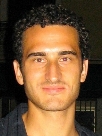 Dr. Liam Brunham is a clinical fellow in General Internal Medicine in the Department of Medicine at the University of British Columbia and a post-doctoral researcher with the Canadian Pharmacogenomics Network for Drug Safety in Vancouver. He completed his PhD in the laboratory of Dr. Michael Hayden. His research has focused on pharmacogenomics of adverse drug reactions as well as on genes involved in lipid metabolism, atherosclerosis and diabetes. He has published more than 25 peer-reviewed manuscripts and has won a number of research including a Young Investigator Award from the Canadian Society for Clinical Investigation, a Gold Medal at the Canadian Institutes of Health Research national poster competition, and the Governor General’s Gold Medal. [Lectures: Ethnic Diversity and Pharmacogenomics]
Dr. Liam Brunham is a clinical fellow in General Internal Medicine in the Department of Medicine at the University of British Columbia and a post-doctoral researcher with the Canadian Pharmacogenomics Network for Drug Safety in Vancouver. He completed his PhD in the laboratory of Dr. Michael Hayden. His research has focused on pharmacogenomics of adverse drug reactions as well as on genes involved in lipid metabolism, atherosclerosis and diabetes. He has published more than 25 peer-reviewed manuscripts and has won a number of research including a Young Investigator Award from the Canadian Society for Clinical Investigation, a Gold Medal at the Canadian Institutes of Health Research national poster competition, and the Governor General’s Gold Medal. [Lectures: Ethnic Diversity and Pharmacogenomics]
 Michael M. Burgess is Professor and Chair in Biomedical Ethics at the W. Maurice Young Centre for Applied Ethics and the Department of Medical Genetics at the University of British Columbia (UBC). He also serves as Principal of the College for Interdisciplinary Studies (CFIS). CFIS enhances UBC’s interdisciplinary innovation and contributions to global citizenship and civil and sustainable society by creating a unique academic environment for research units, graduate programs and interfaculty collaborations. Burgess combines ethical and social theory with social science methods related to policy in health care, health research and biotechnology. Most recently Burgess’ research has focused on science and technology policy and public engagement based on theories of deliberative democracy. He is a co-PI on a Genome Canada/Genome BC-funded “Building a GE3LS Architecture” project and collaborates on other genome science projects. Burgess implemented deliberative engagements on biobanks in BC, the Mayo Clinic and in Western Australia. The deliberative design has also been recently used on issues related to salmon genomics, and bioremediation of military explosive RDX.[Debate: Clinicians should determine the nature and extent of whole genome testing results conveyed to patients]
Michael M. Burgess is Professor and Chair in Biomedical Ethics at the W. Maurice Young Centre for Applied Ethics and the Department of Medical Genetics at the University of British Columbia (UBC). He also serves as Principal of the College for Interdisciplinary Studies (CFIS). CFIS enhances UBC’s interdisciplinary innovation and contributions to global citizenship and civil and sustainable society by creating a unique academic environment for research units, graduate programs and interfaculty collaborations. Burgess combines ethical and social theory with social science methods related to policy in health care, health research and biotechnology. Most recently Burgess’ research has focused on science and technology policy and public engagement based on theories of deliberative democracy. He is a co-PI on a Genome Canada/Genome BC-funded “Building a GE3LS Architecture” project and collaborates on other genome science projects. Burgess implemented deliberative engagements on biobanks in BC, the Mayo Clinic and in Western Australia. The deliberative design has also been recently used on issues related to salmon genomics, and bioremediation of military explosive RDX.[Debate: Clinicians should determine the nature and extent of whole genome testing results conveyed to patients]
 Dr. Bruce Carleton earned his Bachelor degree in pharmaceutical sciences in 1986 from Washington State University. He continued at the University of Utah, earning a Doctor of Pharmacy degree in 1989. After completing a Residency in Clinical Therapeutics at the University of Utah and Primary Children’s Medical Centers with an emphasis in Paediatric Clinical Pharmacology, he took a post-doctoral Fellowship position at the University of Minnesota in Experimental Therapeutics. Dr. Carleton completed a second Fellowship in Immunopharmacology at the University of Minnesota Transplant Center, and then joined the faculty at the University of British Columbia in 1991. Dr. Carleton currently holds the positions of Professor of Paediatrics and Co-Chair, Division of Translational Therapeutics, Faculty of Medicine, University of British Columbia; Director, Pharmaceutical Outcomes Programme (since 1994), BC Children’s Hospital; and Senior Clinician Scientist at the Child & Family Research Institute, Vancouver, BC. He also holds appointments at UBC in the Centre for Health Services and Policy Research and the Faculty of Pharmaceutical Sciences and is an adjunct professor at the School of Health Information Science at University of Victoria. [Lectures: Hype or Hope: Pharmacogenetics to Improve the Safe Use of Drugs]
Dr. Bruce Carleton earned his Bachelor degree in pharmaceutical sciences in 1986 from Washington State University. He continued at the University of Utah, earning a Doctor of Pharmacy degree in 1989. After completing a Residency in Clinical Therapeutics at the University of Utah and Primary Children’s Medical Centers with an emphasis in Paediatric Clinical Pharmacology, he took a post-doctoral Fellowship position at the University of Minnesota in Experimental Therapeutics. Dr. Carleton completed a second Fellowship in Immunopharmacology at the University of Minnesota Transplant Center, and then joined the faculty at the University of British Columbia in 1991. Dr. Carleton currently holds the positions of Professor of Paediatrics and Co-Chair, Division of Translational Therapeutics, Faculty of Medicine, University of British Columbia; Director, Pharmaceutical Outcomes Programme (since 1994), BC Children’s Hospital; and Senior Clinician Scientist at the Child & Family Research Institute, Vancouver, BC. He also holds appointments at UBC in the Centre for Health Services and Policy Research and the Faculty of Pharmaceutical Sciences and is an adjunct professor at the School of Health Information Science at University of Victoria. [Lectures: Hype or Hope: Pharmacogenetics to Improve the Safe Use of Drugs]
 Colin Collins attended Western New England College and received his PhD in Genetics at the University of British Columbia. He has held positions at Lawrence Livermore National Laboratory and Lawrence Berkeley National Laboratory. His work as a member of the UCSF Prostate SPORE has resulted in identification of a suite of DNA based biomarkers that show promise for predicting a patient’s risk of progression and metastasis. Dr. Collins invented and patented End Sequence Profiling (ESP), a sequence-based method for determining the physical structure, complexity, and mutation load of tumor genomes and for direct detection of fusion genes and transcripts. Dr Collins is currently a senior scientist at the Vancouver Prostate Centre and Co-Director of The Microarray Facility. In addition, he is an associate professor at the University of California San Francisco Helen Diller Family Comprehensive Cancer Center and a visiting scientist at Lawrence Berkeley National Laboratory. He has a long-standing interest in the application of genomics to basic and translational cancer research. [Lectures: High-resolution Detection of Copy Number Variation]
Colin Collins attended Western New England College and received his PhD in Genetics at the University of British Columbia. He has held positions at Lawrence Livermore National Laboratory and Lawrence Berkeley National Laboratory. His work as a member of the UCSF Prostate SPORE has resulted in identification of a suite of DNA based biomarkers that show promise for predicting a patient’s risk of progression and metastasis. Dr. Collins invented and patented End Sequence Profiling (ESP), a sequence-based method for determining the physical structure, complexity, and mutation load of tumor genomes and for direct detection of fusion genes and transcripts. Dr Collins is currently a senior scientist at the Vancouver Prostate Centre and Co-Director of The Microarray Facility. In addition, he is an associate professor at the University of California San Francisco Helen Diller Family Comprehensive Cancer Center and a visiting scientist at Lawrence Berkeley National Laboratory. He has a long-standing interest in the application of genomics to basic and translational cancer research. [Lectures: High-resolution Detection of Copy Number Variation]
 Dr. Michelle Demos is a Pediatric Neurologist who has also completed a clinical fellowship and post-doc research fellowship in the field of Medical Genetics. She was recently appointed as a staff Pediatric Neurologist at BC Children’s Hospital and is a clinical assistant professor at the University of British Columbia. Her clinical focus includes seeing patients with neurogenetic disorders, particularly genetic forms of epilepsy. The genetics of pediatric epilepsy is also her major research focus. She is also involved in studying the electroclinical features and genetic cause of a form of Benign Familial Infantile Seizures in BC’s First Nations families. Recently, she has begun using new array technology to identify genomic imbalances in children with intractable cryptogenic or unexplained epilepsy. [Lectures: High-resolution Detection of Copy Number Variation]
Dr. Michelle Demos is a Pediatric Neurologist who has also completed a clinical fellowship and post-doc research fellowship in the field of Medical Genetics. She was recently appointed as a staff Pediatric Neurologist at BC Children’s Hospital and is a clinical assistant professor at the University of British Columbia. Her clinical focus includes seeing patients with neurogenetic disorders, particularly genetic forms of epilepsy. The genetics of pediatric epilepsy is also her major research focus. She is also involved in studying the electroclinical features and genetic cause of a form of Benign Familial Infantile Seizures in BC’s First Nations families. Recently, she has begun using new array technology to identify genomic imbalances in children with intractable cryptogenic or unexplained epilepsy. [Lectures: High-resolution Detection of Copy Number Variation]
 Dr. Patrice Eydoux is the Director of the Cytogenetics laboratory at Children’s and Women’s Health Center of British Columbia and a Clinical Professor at the University of British Columbia. He worked in the area of Cytogenetics at Université Paris VI in France and at McGill University in Quebec. After collaborating with Dr. Friedman and Dr. Marra on the study of small deletions and duplications causing intellectual disabilities and malformations in children, he coordinated the implementation of Chromosome Microarray Analysis (CMA) at BC Children’s Hospital. His current interests are development of CMA in constitutional diseases and cancer, and biological follow-up of duplications and deletions detected in children. [Lectures: Diagnostic Dilemmas: Solving Clinical Problems with Chromosomal Microarray]
Dr. Patrice Eydoux is the Director of the Cytogenetics laboratory at Children’s and Women’s Health Center of British Columbia and a Clinical Professor at the University of British Columbia. He worked in the area of Cytogenetics at Université Paris VI in France and at McGill University in Quebec. After collaborating with Dr. Friedman and Dr. Marra on the study of small deletions and duplications causing intellectual disabilities and malformations in children, he coordinated the implementation of Chromosome Microarray Analysis (CMA) at BC Children’s Hospital. His current interests are development of CMA in constitutional diseases and cancer, and biological follow-up of duplications and deletions detected in children. [Lectures: Diagnostic Dilemmas: Solving Clinical Problems with Chromosomal Microarray]
 Dr. Jan Friedman received his MD from Tulane University in New Orleans and his PhD from the University of Washington in Seattle. Dr. Friedman is a Professor of Medical Genetics at the University of British Columbia, where he served as Head of the Department from 1989 to 1999. He is currently Acting Executive Director of the Child & Family Research Institute and Acting Associate Dean (Research) in the UBC Faculty of Medicine. Dr. Friedman has held leadership positions in international scientific and professional societies, including the founding presidency of the Association of Professors of Human and Medical Genetics, the presidency of the Canadian College of Medical Geneticists, and the presidency of the Teratology Society. He is project leader of the CFI-funded “Canadian Molecular Cytogenetics Platform” and co-leader of the Michael Smith Foundation for Health Research-funded BC Clinical Genomics Network. He is an author of more than 200 peer-reviewed research papers and eight books. [Lectures: 1. Advances in Human Genomics – What You Need to Know; 2. NeurogenOMICS – Exome Sequencing for Intellectual Disability; 3. Genomics: Today and Tomorrow’s Medicine ]
Dr. Jan Friedman received his MD from Tulane University in New Orleans and his PhD from the University of Washington in Seattle. Dr. Friedman is a Professor of Medical Genetics at the University of British Columbia, where he served as Head of the Department from 1989 to 1999. He is currently Acting Executive Director of the Child & Family Research Institute and Acting Associate Dean (Research) in the UBC Faculty of Medicine. Dr. Friedman has held leadership positions in international scientific and professional societies, including the founding presidency of the Association of Professors of Human and Medical Genetics, the presidency of the Canadian College of Medical Geneticists, and the presidency of the Teratology Society. He is project leader of the CFI-funded “Canadian Molecular Cytogenetics Platform” and co-leader of the Michael Smith Foundation for Health Research-funded BC Clinical Genomics Network. He is an author of more than 200 peer-reviewed research papers and eight books. [Lectures: 1. Advances in Human Genomics – What You Need to Know; 2. NeurogenOMICS – Exome Sequencing for Intellectual Disability; 3. Genomics: Today and Tomorrow’s Medicine ]
 Dr. Richard Harrigan is the Director of Research Laboratories at the BC Center for Excellence in HIV/AIDS. His work primarily focuses on HIV drug efficacy, drug resistance, and the human and viral parameters that influence HIV disease progression. At the BC Center for Excellence in HIV/AIDS, his work has involved investigations using three major cohort studies, as well as the more than 5000 patients in the BC Drug Treatment Program. Before working at the CfE, Dr. Harrigan was at the pharmaceutical companies Wellcome and Glaxo Wellcome in the United Kingdom. Dr. Harrigan was one of the first to demonstrate the potential clinical utility of HIV drug resistance testing and introduced one of Canada’s (and one of the worlds) first broadly based clinical HIV drug resistance testing program. Dr Harrigan is currently investigating the possibility of determining viral tropism via genotypic testing utilizing novel deep-sequencing technologies. Dr. Harrigan holds the Glen-Hillson Professorship in Clinical HIV Virology and the CIHR-GSK Research Chair in HIV/AIDS at the University of British Columbia, and is an Associate Professor in the Division of AIDS (Faculty of Medicine) at the University of British Columbia. [Lectures: PharmacogenOMICS – Applications to HIV therapy]
Dr. Richard Harrigan is the Director of Research Laboratories at the BC Center for Excellence in HIV/AIDS. His work primarily focuses on HIV drug efficacy, drug resistance, and the human and viral parameters that influence HIV disease progression. At the BC Center for Excellence in HIV/AIDS, his work has involved investigations using three major cohort studies, as well as the more than 5000 patients in the BC Drug Treatment Program. Before working at the CfE, Dr. Harrigan was at the pharmaceutical companies Wellcome and Glaxo Wellcome in the United Kingdom. Dr. Harrigan was one of the first to demonstrate the potential clinical utility of HIV drug resistance testing and introduced one of Canada’s (and one of the worlds) first broadly based clinical HIV drug resistance testing program. Dr Harrigan is currently investigating the possibility of determining viral tropism via genotypic testing utilizing novel deep-sequencing technologies. Dr. Harrigan holds the Glen-Hillson Professorship in Clinical HIV Virology and the CIHR-GSK Research Chair in HIV/AIDS at the University of British Columbia, and is an Associate Professor in the Division of AIDS (Faculty of Medicine) at the University of British Columbia. [Lectures: PharmacogenOMICS – Applications to HIV therapy]
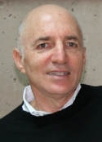 Dr. Michael Hayden is the Killam Professor of Medical Genetics at the UBC and Canada Research Chair in Human Genetics and Molecular Medicine. He is the Director of the Center for Molecular Medicine and Therapeutics (CMMT). He is also co-leader of the Canadian Pharmacogenomics Network for Drug Safety project, a BC-led Genome Canada-funded, national strategy to prevent adverse drug reactions. Author of over 700 peer-reviewed publications and invited submissions, Michael focuses his research primarily on genetic diseases, including the genetics of lipoprotein disorders, Huntington disease, predictive and personalized medicine. Michael is also the most cited author in the world for ABCA1 and Huntington Disease.Michael is the recipient of numerous recent prestigious honours and awards. These awards include the Aubrey J. Tingle Prize, the Margolese National Brain Disorder Prize, the Killam Prize by the Canada Council of the Arts, the Genome BC Award for Scientific Excellence, and the Canada Gairdner Wightman award and the Prix Galien. Michael has also been awarded the Order of Canada, the Order of British Columbia and he was named Canada’s Health Researcher of the Year by CIHR in 2008. [Lectures: 1. Personalized Medicine: Fulfilling the Promise; 2. BCCGN and Personalized Medicine – Our Mandate, Our Successes and Our Learnings]
Dr. Michael Hayden is the Killam Professor of Medical Genetics at the UBC and Canada Research Chair in Human Genetics and Molecular Medicine. He is the Director of the Center for Molecular Medicine and Therapeutics (CMMT). He is also co-leader of the Canadian Pharmacogenomics Network for Drug Safety project, a BC-led Genome Canada-funded, national strategy to prevent adverse drug reactions. Author of over 700 peer-reviewed publications and invited submissions, Michael focuses his research primarily on genetic diseases, including the genetics of lipoprotein disorders, Huntington disease, predictive and personalized medicine. Michael is also the most cited author in the world for ABCA1 and Huntington Disease.Michael is the recipient of numerous recent prestigious honours and awards. These awards include the Aubrey J. Tingle Prize, the Margolese National Brain Disorder Prize, the Killam Prize by the Canada Council of the Arts, the Genome BC Award for Scientific Excellence, and the Canada Gairdner Wightman award and the Prix Galien. Michael has also been awarded the Order of Canada, the Order of British Columbia and he was named Canada’s Health Researcher of the Year by CIHR in 2008. [Lectures: 1. Personalized Medicine: Fulfilling the Promise; 2. BCCGN and Personalized Medicine – Our Mandate, Our Successes and Our Learnings]
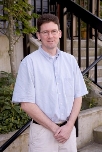 Dr. Rob Holt grew up in the Vancouver area and studied science at the University of British Columbia. He received his PhD in Pharmacology from the University of Alberta in 1998. After a brief Postdoctoral Fellowship in Molecular Evolution at the State University ofNew York, Dr. Holt moved to Celera Genomics where he was the Sr. Scientific Operations Manager for sequencing of the human genome and the Principal Investigator for the sequencing of additional model organism genomes. Since 2002Dr. Holthas been a Sr. Scientist and at the Genome Sciences Centre, BC Cancer Agency. He is co-director of the Genome Canada/GenomeBritish ColumbiaGenomics platform and he holds faculty appointments at Simon Fraser University and the University of British Columbia. He is internationally recognized in the field of genomics and his research group is applying genomics methods to problems in immunology, oncology, neurobiology, evolutionary biology, synthetic biology and metagenomics. [Lectures: MetagenOMICS – An Approach to Infectious Agent Discovery in Cancer]
Dr. Rob Holt grew up in the Vancouver area and studied science at the University of British Columbia. He received his PhD in Pharmacology from the University of Alberta in 1998. After a brief Postdoctoral Fellowship in Molecular Evolution at the State University ofNew York, Dr. Holt moved to Celera Genomics where he was the Sr. Scientific Operations Manager for sequencing of the human genome and the Principal Investigator for the sequencing of additional model organism genomes. Since 2002Dr. Holthas been a Sr. Scientist and at the Genome Sciences Centre, BC Cancer Agency. He is co-director of the Genome Canada/GenomeBritish ColumbiaGenomics platform and he holds faculty appointments at Simon Fraser University and the University of British Columbia. He is internationally recognized in the field of genomics and his research group is applying genomics methods to problems in immunology, oncology, neurobiology, evolutionary biology, synthetic biology and metagenomics. [Lectures: MetagenOMICS – An Approach to Infectious Agent Discovery in Cancer]
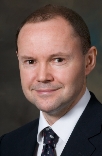 Dr. David Huntsman holds numerous awards and has the titles of Professor in the Departments of Pathology and Laboratory Medicine and Obstetrics and Gynaecology/UBC; Dr. Chew Wei
Dr. David Huntsman holds numerous awards and has the titles of Professor in the Departments of Pathology and Laboratory Medicine and Obstetrics and Gynaecology/UBC; Dr. Chew Wei
Memorial Professor of Gynaelcologic Oncology; Staff Pathologist at the BC Cancer Agency (BCCA); and Consulting Pathologist at the Vancouver General Hospital (VGH). Dr. Huntsman is currently the Director of the BC multidisciplinary ovarian cancer research team (OvCaRe), Medical Director of the Centre for Translational and Applied Genomics (CTAG) at the BCCA, and co-Director of the Genetic Pathology Evaluation Centre (GPEC) at the Jack Bell Research Centre, VGH. Dr. Huntsman’s research has led to development of predictive and prognostic tissue based cancer biomarkers for ovarian cancer and a wide variety of other tumor types. His team created a blueprint for subtype specific ovarian cancer control and have been leaders in the application of novel genomics technologies to ovarian cancer. As collaboration is critical in his field, Dr. Huntsman engages in a wide number of multidisciplinary research groups. Most recently he has been working with Professor Pieter Cullis on the creation of a broad based personalized medicine initiative for British Columbia. Dr. Huntsman has recently been awarded the inaugural Virginia Greene leadership award for ovarian cancer research and advocacy (Sept 2011). [Lectures: Clinical Application of Genomics in Cancer]
 Tania Katan is an award-winning author, keynote speaker and solo-performer who calls Phoenix, Arizona home. Her memoir My One-Night Stand With Cancer has received the Stonewall Book Award, Publishing Triangle Award, and a finalist for the Lambda Literary Award. Rock-n-Roller Melissa Etheridge said of Katan’s book, “This book rocks! It’s passionate, playful, and downright beautiful.” As a keynote speaker and solo-performer, Katan has appeared at the Edinburgh Festival Fringe, ACT Seattle, NPR Snap Judgment, Frigid New York, Loyola Marymount University, Planned Parenthood, Rethink Breast Cancer: Toronto, The Painted Bride, Comedy Central Stage,TEDx, and more. Her performances and published work have been written about in The Scotsman, The Advocate, The New York Times, and more. She is a guest lecturer, topless marathon runner, and has a winning smile! [Keynote: Using Humor and Storytelling to Help Rewrite Our Genetic Code
Tania Katan is an award-winning author, keynote speaker and solo-performer who calls Phoenix, Arizona home. Her memoir My One-Night Stand With Cancer has received the Stonewall Book Award, Publishing Triangle Award, and a finalist for the Lambda Literary Award. Rock-n-Roller Melissa Etheridge said of Katan’s book, “This book rocks! It’s passionate, playful, and downright beautiful.” As a keynote speaker and solo-performer, Katan has appeared at the Edinburgh Festival Fringe, ACT Seattle, NPR Snap Judgment, Frigid New York, Loyola Marymount University, Planned Parenthood, Rethink Breast Cancer: Toronto, The Painted Bride, Comedy Central Stage,TEDx, and more. Her performances and published work have been written about in The Scotsman, The Advocate, The New York Times, and more. She is a guest lecturer, topless marathon runner, and has a winning smile! [Keynote: Using Humor and Storytelling to Help Rewrite Our Genetic Code
 Dr. Aly Karsan is Professor of Pathology and Laboratory Medicine, University of British Columbia, and Medical Director of the Cancer Genetics Laboratory, and Head of Clinical Diagnostic Genomics at the Genome Sciences Centre, at the British Columbia Cancer Agency. He received his MD from Queen’s University at Kingston and following his internship worked in Canada’s North as a GP, and volunteered with Medecins Sans Frontieres. He then completed a residency in Hematological Pathology at the University of British Columbia, followed by a research fellowship at the University of Washington in Seattle. He was previously a Clinician-Scientist of the Canadian Institutes of Health Research, and is currently a Senior Scholar of the Michael Smith Foundation for Health Research. [Lectures: Genetic and Genomic Testing for Cancer Diagnosis and Therapy]
Dr. Aly Karsan is Professor of Pathology and Laboratory Medicine, University of British Columbia, and Medical Director of the Cancer Genetics Laboratory, and Head of Clinical Diagnostic Genomics at the Genome Sciences Centre, at the British Columbia Cancer Agency. He received his MD from Queen’s University at Kingston and following his internship worked in Canada’s North as a GP, and volunteered with Medecins Sans Frontieres. He then completed a residency in Hematological Pathology at the University of British Columbia, followed by a research fellowship at the University of Washington in Seattle. He was previously a Clinician-Scientist of the Canadian Institutes of Health Research, and is currently a Senior Scholar of the Michael Smith Foundation for Health Research. [Lectures: Genetic and Genomic Testing for Cancer Diagnosis and Therapy]
 Michael S. Kobor began his academic studies in his native Germany, coming to Canada to complete his PhD in Medical Genetics (Biochemistry) at the University of Toronto. His postdoctoral training was at the University of California, Berkeley, in Molecular and Cell Biology. Dr. Kobor is currently an Assistant Professor in the Department of Medical Genetics at the UBC where he is appointed as a Scientist at the Centre for Molecular Medicine and Therapeutics. He is a continuing member of the Canadian Institute for Advanced Research’s Experience-based Brain & Biological Development Program and a Michael Smith Foundation for Health Research Scholar. Recently, Dr. Kobor’s research focus has been to investigate epigenetic variation in humans, with a particular focus on the effects of social environment, as well as testing for epigenetic patterns correlated with respiratory disease. [Lectures: Epigenetic Variation and its Impact on Human Health and Disease]
Michael S. Kobor began his academic studies in his native Germany, coming to Canada to complete his PhD in Medical Genetics (Biochemistry) at the University of Toronto. His postdoctoral training was at the University of California, Berkeley, in Molecular and Cell Biology. Dr. Kobor is currently an Assistant Professor in the Department of Medical Genetics at the UBC where he is appointed as a Scientist at the Centre for Molecular Medicine and Therapeutics. He is a continuing member of the Canadian Institute for Advanced Research’s Experience-based Brain & Biological Development Program and a Michael Smith Foundation for Health Research Scholar. Recently, Dr. Kobor’s research focus has been to investigate epigenetic variation in humans, with a particular focus on the effects of social environment, as well as testing for epigenetic patterns correlated with respiratory disease. [Lectures: Epigenetic Variation and its Impact on Human Health and Disease]
 Dr. Sylvie Langlois obtained her MD degree from the University of Sherbrooke in Quebec. She went on to do specialty training in Pediatrics at McGill University and Fellowship training in Clinical and Molecular Genetics at the University of British Columbia. She has been a clinical geneticist at the Children’s and Women’s Health Center since 1989 and is a Professor in the Dept of Medical Genetics at the University of British Columbia. She has been the medical director of the BC Prenatal Genetic Screening Program since its implementation. She is currently chair of the prenatal diagnosis committee of the Canadian College of Medical Geneticists. Her current research is in the use of genomic technologies to identify the genetic basis of rare syndromes. [Debate: Clinicians should determine the nature and extent of whole genome testing results conveyed to patients]
Dr. Sylvie Langlois obtained her MD degree from the University of Sherbrooke in Quebec. She went on to do specialty training in Pediatrics at McGill University and Fellowship training in Clinical and Molecular Genetics at the University of British Columbia. She has been a clinical geneticist at the Children’s and Women’s Health Center since 1989 and is a Professor in the Dept of Medical Genetics at the University of British Columbia. She has been the medical director of the BC Prenatal Genetic Screening Program since its implementation. She is currently chair of the prenatal diagnosis committee of the Canadian College of Medical Geneticists. Her current research is in the use of genomic technologies to identify the genetic basis of rare syndromes. [Debate: Clinicians should determine the nature and extent of whole genome testing results conveyed to patients]
 Dr. Anna Lehman is an assistant professor in the Department of Medical Genetics at the University of British Columbia, as well a practicing clinician in the Provincial Medical Genetics Programme and the Adult Metabolic Diseases Clinic. In her research she works on phenotyping and gene discovery in the area of rare malformation and metabolic disorders. She trained at the University of British Columbia.[Lectures: Is High Throughput Sequencing Ready for the Clinic?]
Dr. Anna Lehman is an assistant professor in the Department of Medical Genetics at the University of British Columbia, as well a practicing clinician in the Provincial Medical Genetics Programme and the Adult Metabolic Diseases Clinic. In her research she works on phenotyping and gene discovery in the area of rare malformation and metabolic disorders. She trained at the University of British Columbia.[Lectures: Is High Throughput Sequencing Ready for the Clinic?]
 Dr. Patrick MacCleod As a medical doctor and clinical investigator, Dr. Patrick MacLeod is a vital link between molecular researchers at the Centre for Biomedical Research and patients in Greater Victoria. He recently stepped down as medical director of the Medical Genetics Program at the Victoria General Hospital. He now divides his time between teaching in UVic’s Biology Department, clinical work with the Vancouver Island Health Authority and collaborating on numerous research projects. MacLeod’s specialty is tracking and diagnosing genetic disorders. He is currently excited by two projects: finding a genetic cure for Rett syndrome, and developing prenatal screening for Spinal Cerebular Ataxia type 2 (SCA2) with collaborators in Cuba.
Dr. Patrick MacCleod As a medical doctor and clinical investigator, Dr. Patrick MacLeod is a vital link between molecular researchers at the Centre for Biomedical Research and patients in Greater Victoria. He recently stepped down as medical director of the Medical Genetics Program at the Victoria General Hospital. He now divides his time between teaching in UVic’s Biology Department, clinical work with the Vancouver Island Health Authority and collaborating on numerous research projects. MacLeod’s specialty is tracking and diagnosing genetic disorders. He is currently excited by two projects: finding a genetic cure for Rett syndrome, and developing prenatal screening for Spinal Cerebular Ataxia type 2 (SCA2) with collaborators in Cuba.
 Ms Nancy Makela is a public health nurse and researcher. She has a BSc and an RN. She has worked on a diverse variety of projects including a Health Technology Assessment project looking at the health care and health policy challenges in genetic laboratory services, research projects involving HIV, SARS, and Avian Influenza in various cities with locations in hospitals, prisons, clinics and trailers in fields. She has also spent many years doing clinical trials and before that she enjoyed hospital and community nursing. Nancy is currently working on a HPV Vaccine Study at the Women’s Health Research Institute.[Lectures: Parental perspectives of receiving a diagnosis for their child’s intellectual disability]
Ms Nancy Makela is a public health nurse and researcher. She has a BSc and an RN. She has worked on a diverse variety of projects including a Health Technology Assessment project looking at the health care and health policy challenges in genetic laboratory services, research projects involving HIV, SARS, and Avian Influenza in various cities with locations in hospitals, prisons, clinics and trailers in fields. She has also spent many years doing clinical trials and before that she enjoyed hospital and community nursing. Nancy is currently working on a HPV Vaccine Study at the Women’s Health Research Institute.[Lectures: Parental perspectives of receiving a diagnosis for their child’s intellectual disability]
 Dr. Carlo Marra earned his BSc (Pharm) degree in 1992, completed a hospital pharmacy residency at Vancouver General Hospital in 1993, and obtained a PharmD in 1995, all from the University of British Columbia. From 1995 to 1999, he worked as a research pharmacist before enrolling in the PhD program in Health Care and Epidemiology at the University of British Columbia which he completed in 2004. Currently, he holds positions of Associate Professor, Faculty of Pharmaceutical Sciences, University of British Columbia; Director, Collaboration for Outcomes Research and Evaluation (CORE), University of British Columbia; and Scientist, Centre for Health Evaluation and Outcome Sciences (CHEOS), Providence Health. Carlo is also a Tier II Canada Research Chair in Pharmaceutical Outcomes. [Lectures: Personalized Medicine: Value for Money?]
Dr. Carlo Marra earned his BSc (Pharm) degree in 1992, completed a hospital pharmacy residency at Vancouver General Hospital in 1993, and obtained a PharmD in 1995, all from the University of British Columbia. From 1995 to 1999, he worked as a research pharmacist before enrolling in the PhD program in Health Care and Epidemiology at the University of British Columbia which he completed in 2004. Currently, he holds positions of Associate Professor, Faculty of Pharmaceutical Sciences, University of British Columbia; Director, Collaboration for Outcomes Research and Evaluation (CORE), University of British Columbia; and Scientist, Centre for Health Evaluation and Outcome Sciences (CHEOS), Providence Health. Carlo is also a Tier II Canada Research Chair in Pharmaceutical Outcomes. [Lectures: Personalized Medicine: Value for Money?]
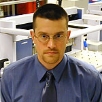 Dr. Marco Marra is the Director of Canada’s Michael Smith Genome Sciences Centre at the BC Cancer Agency; a Senior Scientist at the British Columbia Cancer Research Centre; a Professor in the Department of Medical Genetics at the University of British Columbia and an Adjunct Professor in the Department of Molecular Biology & Biochemistry at Simon Fraser University. Dr. Marra received his B.Sc. in Molecular & Cell Biology and his Ph.D. in Genetics from Simon Fraser University in 1989 and 1994, respectively. The next five years were spent pursuing post-doctoral training at Washington University School of Medicine Genome Sequencing Center, in St. Louis, Missouri. Dr. Marra was awarded the Frontiers of Research Award by the BC Innovation Council in 2008 and elected as a Fellow of The Royal Society of Canada in 2007. He is also the recipient of the 2007 Merck Frosst Prize, a Michael Smith Foundation for Health Research Career Investigator Senior Scholar Award and a Simon Fraser University President’s 40th Anniversary Award. He received a Terry Fox Young Investigator Award (2004), BC Biotech’s Innovation and Achievement Award (together with the entire GSC staff) for being the first group in the world to sequence the genome of the coronavirus responsible for severe acute respiratory syndrome (SARS) (2004), and a Michael Smith Foundation for Health Research Career Investigator Scholar Award (2001). [Lectures: High-throughput Sequencing]
Dr. Marco Marra is the Director of Canada’s Michael Smith Genome Sciences Centre at the BC Cancer Agency; a Senior Scientist at the British Columbia Cancer Research Centre; a Professor in the Department of Medical Genetics at the University of British Columbia and an Adjunct Professor in the Department of Molecular Biology & Biochemistry at Simon Fraser University. Dr. Marra received his B.Sc. in Molecular & Cell Biology and his Ph.D. in Genetics from Simon Fraser University in 1989 and 1994, respectively. The next five years were spent pursuing post-doctoral training at Washington University School of Medicine Genome Sequencing Center, in St. Louis, Missouri. Dr. Marra was awarded the Frontiers of Research Award by the BC Innovation Council in 2008 and elected as a Fellow of The Royal Society of Canada in 2007. He is also the recipient of the 2007 Merck Frosst Prize, a Michael Smith Foundation for Health Research Career Investigator Senior Scholar Award and a Simon Fraser University President’s 40th Anniversary Award. He received a Terry Fox Young Investigator Award (2004), BC Biotech’s Innovation and Achievement Award (together with the entire GSC staff) for being the first group in the world to sequence the genome of the coronavirus responsible for severe acute respiratory syndrome (SARS) (2004), and a Michael Smith Foundation for Health Research Career Investigator Scholar Award (2001). [Lectures: High-throughput Sequencing]
 Dr. Barbara McGillivray is a professor in the Department of Medical Genetics at the University of British Columbia, as well as a clinical geneticist in the Department of Medical Genetics, Children’s and Women’s Health Centre of British Columbia. Dr. McGillivray has been involved in patient care, particularly in an outreach setting, research involving inherited cancers, prenatal diagnosis, and the delineation of clinical conditions. Dr. McGillivray has been involved for many years in the field of ethics of research involving humans. She was a member of the Tri-Council Working Group writing the Code of Ethical Conduct for Research Involving Humans, a member of the Standing Committee on Ethics of MRC and CIHR. She is also an experienced REB Chair, and presently a member of the Health Canada REB. [Lectures: Genomic Medicine and the Clinic: Ethical implications]
Dr. Barbara McGillivray is a professor in the Department of Medical Genetics at the University of British Columbia, as well as a clinical geneticist in the Department of Medical Genetics, Children’s and Women’s Health Centre of British Columbia. Dr. McGillivray has been involved in patient care, particularly in an outreach setting, research involving inherited cancers, prenatal diagnosis, and the delineation of clinical conditions. Dr. McGillivray has been involved for many years in the field of ethics of research involving humans. She was a member of the Tri-Council Working Group writing the Code of Ethical Conduct for Research Involving Humans, a member of the Standing Committee on Ethics of MRC and CIHR. She is also an experienced REB Chair, and presently a member of the Health Canada REB. [Lectures: Genomic Medicine and the Clinic: Ethical implications]
 Dr. Richard Moore has a B.Sc. in molecular biology and biochemistry from Durham University and a PhD. in retroviruses and human leukaemia from Cambridge University in the United Kingdom. He continued his postdoctoral research at Cambridge University on human papillomavirus life cycle and pre-clinical vaccines. He did some further postdoctoral research on human papillomavirus type distribution in the screened population at the Genome Sciences Centre, BC Cancer Agency in Vancouver. His current position is the Sequencing Group Leader at the Genome Sciences Centre of the BC Cancer Agency. His research interests include infectious agents and cancer, high throughput genomics and technical development of the latest sequencing technologies. [Lectures: Sequencing in 2010; from Kilobases to Terabases]
Dr. Richard Moore has a B.Sc. in molecular biology and biochemistry from Durham University and a PhD. in retroviruses and human leukaemia from Cambridge University in the United Kingdom. He continued his postdoctoral research at Cambridge University on human papillomavirus life cycle and pre-clinical vaccines. He did some further postdoctoral research on human papillomavirus type distribution in the screened population at the Genome Sciences Centre, BC Cancer Agency in Vancouver. His current position is the Sequencing Group Leader at the Genome Sciences Centre of the BC Cancer Agency. His research interests include infectious agents and cancer, high throughput genomics and technical development of the latest sequencing technologies. [Lectures: Sequencing in 2010; from Kilobases to Terabases]
 Dr Tanya Nelson is a Clinical Molecular Geneticist and Associate Director of the Molecular Genetics Laboratory at the BC Children’s and BC Women’s Hospitals in Vancouver. She is a Clinical Associate Professor in the Department of Pathology and Laboratory Medicine, and an Associate Member of the Department of Medical Genetics, at the University of British Columbia. She is also currently the Chair of the Canadian College of Medical Geneticists (CCMG) Education, Ethics and Public Policy committee, and is a member of the CCMG Prenatal Diagnosis committee. Dr. Nelson did her PhD at UBC in molecular cytogenetics with Drs Stephen Wood and Fred Dill, and then embarked on a post doc at the UBC Jack Bell Research center with Dr Rob McMaster. [Lectures: 5 Things About Genomic Testing Over the Internet that you Need to Know as a Family Physician]
Dr Tanya Nelson is a Clinical Molecular Geneticist and Associate Director of the Molecular Genetics Laboratory at the BC Children’s and BC Women’s Hospitals in Vancouver. She is a Clinical Associate Professor in the Department of Pathology and Laboratory Medicine, and an Associate Member of the Department of Medical Genetics, at the University of British Columbia. She is also currently the Chair of the Canadian College of Medical Geneticists (CCMG) Education, Ethics and Public Policy committee, and is a member of the CCMG Prenatal Diagnosis committee. Dr. Nelson did her PhD at UBC in molecular cytogenetics with Drs Stephen Wood and Fred Dill, and then embarked on a post doc at the UBC Jack Bell Research center with Dr Rob McMaster. [Lectures: 5 Things About Genomic Testing Over the Internet that you Need to Know as a Family Physician]
 Mr. Mehdi Najafzadeh is a Ph.D. student with Dr. Carlo Marra in faculty of Pharmaceutical Science, University of British Columbia. His doctoral thesis is focused on measuring preferences of the public and of physicians towards new genetic tools and personalized medicine. Mehdi’s doctoral research is being supported by a Canada Graduate Scholarship from CIHR, and he also holds a Four-Year Fellowship from UBC. In addition to his M.A. in Economics from the University of British Columbia, Mehdi holds a B.Sc. in Electrical Engineering from Sharif University of Technology and a M.Sc. degree in socioeconomic systems engineering from the Institute for Research on Planning and Development (IRPD) both located in Tehran. He has joined Collaboration for Outcomes Research and Evaluation (CORE) since 2005 as a health economist. Mehdi has been involved in several studies for cost effectiveness and harm benefit analysis of novel therapeutics and his research interests include applications of economics theory, mathematical modeling, and statistical methods in health technology assessment and in public health in general. [Lectures: Barriers for integrating genomics and personalized medicine into clinical practice]
Mr. Mehdi Najafzadeh is a Ph.D. student with Dr. Carlo Marra in faculty of Pharmaceutical Science, University of British Columbia. His doctoral thesis is focused on measuring preferences of the public and of physicians towards new genetic tools and personalized medicine. Mehdi’s doctoral research is being supported by a Canada Graduate Scholarship from CIHR, and he also holds a Four-Year Fellowship from UBC. In addition to his M.A. in Economics from the University of British Columbia, Mehdi holds a B.Sc. in Electrical Engineering from Sharif University of Technology and a M.Sc. degree in socioeconomic systems engineering from the Institute for Research on Planning and Development (IRPD) both located in Tehran. He has joined Collaboration for Outcomes Research and Evaluation (CORE) since 2005 as a health economist. Mehdi has been involved in several studies for cost effectiveness and harm benefit analysis of novel therapeutics and his research interests include applications of economics theory, mathematical modeling, and statistical methods in health technology assessment and in public health in general. [Lectures: Barriers for integrating genomics and personalized medicine into clinical practice]
 Dr. Millan Patel obtained his MD and Masters in Genetics degrees at the University of Alberta and completed his residency training in Medical Genetics at the Hospital for Sick Children in Toronto. Pursuing a research interest in bone biology, Millan studied mouse models of rare human bone disorders and circadian clocks in bone and brain during his post-doctoral research at Baylor College of Medicine in Houston, Texas. He is currently a clinical assistant professor in the Department of Medical Genetics at the University of British Columbia. He is also the co-director for BC of the Canadian Multicentre Osteoporosis Study and a co-founder of the Rare Disease Foundation. His research interests focus on rare bone disorders and what they can teach us about common bone disorders like osteoporosis, as well as the role of the sympathetic nervous system and other nerves in the regulation of bone metabolism. [Debate: Direct-to-consumer testing allows individual autonomy and empowerment]
Dr. Millan Patel obtained his MD and Masters in Genetics degrees at the University of Alberta and completed his residency training in Medical Genetics at the Hospital for Sick Children in Toronto. Pursuing a research interest in bone biology, Millan studied mouse models of rare human bone disorders and circadian clocks in bone and brain during his post-doctoral research at Baylor College of Medicine in Houston, Texas. He is currently a clinical assistant professor in the Department of Medical Genetics at the University of British Columbia. He is also the co-director for BC of the Canadian Multicentre Osteoporosis Study and a co-founder of the Rare Disease Foundation. His research interests focus on rare bone disorders and what they can teach us about common bone disorders like osteoporosis, as well as the role of the sympathetic nervous system and other nerves in the regulation of bone metabolism. [Debate: Direct-to-consumer testing allows individual autonomy and empowerment]
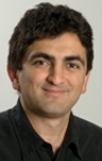 Rod Rassekh grew up in Vancouver and then went east for a Microbiology & Immunology degree at McGill University. He returned to Vancouver for medical school graduating in 2000. He completed pediatric residency in 2004 and was chief resident in his 4th year. He then went on to do a fellowship in Pediatric Oncology at BC Children’s Hospital completing this and starting on faculty as a Clinical Assistant Professor in the division of pediatric Hematology/Oncology/BMT in 2007. His clinical interests are in CNS tumors and in all areras of supportive care. He has a specific interest in infections and adverse drug events. His research interests are in the pharmacogenetics of adverse events to chemotherapy and specifically in cisplatin and anthracycline toxicity, for which he is the PI in a cross-Canadian trial. He completed a Masters of Health Science in epidemiology in 2007.[Lectures: High-throughput Genotyping]
Rod Rassekh grew up in Vancouver and then went east for a Microbiology & Immunology degree at McGill University. He returned to Vancouver for medical school graduating in 2000. He completed pediatric residency in 2004 and was chief resident in his 4th year. He then went on to do a fellowship in Pediatric Oncology at BC Children’s Hospital completing this and starting on faculty as a Clinical Assistant Professor in the division of pediatric Hematology/Oncology/BMT in 2007. His clinical interests are in CNS tumors and in all areras of supportive care. He has a specific interest in infections and adverse drug events. His research interests are in the pharmacogenetics of adverse events to chemotherapy and specifically in cisplatin and anthracycline toxicity, for which he is the PI in a cross-Canadian trial. He completed a Masters of Health Science in epidemiology in 2007.[Lectures: High-throughput Genotyping]
 Dr. Rosie Redfield N/A [Personal Account: Direct To Consumer (DTC) Testing]
Dr. Rosie Redfield N/A [Personal Account: Direct To Consumer (DTC) Testing]
 James Reston Jr. Renowned author and playwright James Reston Jr. will share his personal story about being the father of a child with an unknown genetic disorder. At the age of 18 months, his daughter Hillary suffered a mysterious series of fevers, which turned the smart, active child into a mentally handicapped and seriously physically ill toddler. James will discuss the impact of endless visits with specialists, tests and laboratory experimentation, as well as the nonstop quest for answers regarding Hillary’s condition. [Keynote When a Disease is Rare]
James Reston Jr. Renowned author and playwright James Reston Jr. will share his personal story about being the father of a child with an unknown genetic disorder. At the age of 18 months, his daughter Hillary suffered a mysterious series of fevers, which turned the smart, active child into a mentally handicapped and seriously physically ill toddler. James will discuss the impact of endless visits with specialists, tests and laboratory experimentation, as well as the nonstop quest for answers regarding Hillary’s condition. [Keynote When a Disease is Rare]
 Stefan Rolando will relate his experience of suffering from chronic pain for many years, and undertaking numerous medical and specialist visits. His journey also led him to participate in various clinical drug trials and endure different adverse drug reactions. Genomic testing as suggested by a psychiatrist, led to some interesting findings and he has spent the last year trying to find appropriate professionals to interpret the results. [Personal Account: Direct To Consumer (DTC) Testing]
Stefan Rolando will relate his experience of suffering from chronic pain for many years, and undertaking numerous medical and specialist visits. His journey also led him to participate in various clinical drug trials and endure different adverse drug reactions. Genomic testing as suggested by a psychiatrist, led to some interesting findings and he has spent the last year trying to find appropriate professionals to interpret the results. [Personal Account: Direct To Consumer (DTC) Testing]
 Colin Ross has a M.Sc. in Medical Genetics from the UK and a Ph.D. in Genetics from McMaster University. He did a Post-doctoral fellowship in Medical Genetics at UBC and is currently working as a Research Associate with Dr. Michael Hayden at the Centre for Molecular Medicine and Therapeutics. His research focus is on pharmacogenomics of severe adverse drug reactions: Why do some people respond positively to a certain medication, while another patient of similar age, ancestry, and in a similar environment may develop a severe, debilitating or life-threatening reaction to the same dose of medication? His group is using high-throughput genomics technologies to identify genetic factors that cause these severe reactions. [Lectures: High-throughput Genotyping]
Colin Ross has a M.Sc. in Medical Genetics from the UK and a Ph.D. in Genetics from McMaster University. He did a Post-doctoral fellowship in Medical Genetics at UBC and is currently working as a Research Associate with Dr. Michael Hayden at the Centre for Molecular Medicine and Therapeutics. His research focus is on pharmacogenomics of severe adverse drug reactions: Why do some people respond positively to a certain medication, while another patient of similar age, ancestry, and in a similar environment may develop a severe, debilitating or life-threatening reaction to the same dose of medication? His group is using high-throughput genomics technologies to identify genetic factors that cause these severe reactions. [Lectures: High-throughput Genotyping]
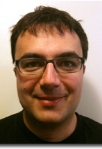 Dr. Jacob Rozmus received his MD from the University of Alberta. He completed residency training in Pediatrics and recently finished his fellowship in Pediatric Hematology/Oncology & BMT at BC Children’s Hospital. He is currently an attending physician in the Division of Pediatric Oncology/Hematology & BMT and a PhD candidate in the Department of Pathology & Laboratory Medicine at UBC. His research focuses on the diagnosis and treatment of primary immunodeficiencies with bone marrow transplant and complications of bone marrow transplant such as graft-versus-host disease.[Lectures: Can Sequencing Help Treat Dying Children?]
Dr. Jacob Rozmus received his MD from the University of Alberta. He completed residency training in Pediatrics and recently finished his fellowship in Pediatric Hematology/Oncology & BMT at BC Children’s Hospital. He is currently an attending physician in the Division of Pediatric Oncology/Hematology & BMT and a PhD candidate in the Department of Pathology & Laboratory Medicine at UBC. His research focuses on the diagnosis and treatment of primary immunodeficiencies with bone marrow transplant and complications of bone marrow transplant such as graft-versus-host disease.[Lectures: Can Sequencing Help Treat Dying Children?]
 Tamara Taggart graduated from BCIT in Broadcast Communications. Following this she worked in many areas ranging from radio to concert promoting. Her career in television began in 1997. On August 21, 2009 Tamara co-hosted with Regis Philbin of Live. Tamara has been anchoring CTV News at Six since January 3, 2011. She was chosen to represent CTV British Columbia on CTV’s national news team broadcasting from the 2010 Vancouver Winter Olympic Games. Tamara has been with CTV British Columbia for 13 years, including stints as co-host of Vancouver Breakfast as well as the weathercaster for CTV News at Five, CTV News at Six and CTV News at 11:30. Tamara and her husband David have three children, one of whom, has Down’s syndrome. [Keynote: Life with my sweet son Beckett who happens to have an extra chromosome]
Tamara Taggart graduated from BCIT in Broadcast Communications. Following this she worked in many areas ranging from radio to concert promoting. Her career in television began in 1997. On August 21, 2009 Tamara co-hosted with Regis Philbin of Live. Tamara has been anchoring CTV News at Six since January 3, 2011. She was chosen to represent CTV British Columbia on CTV’s national news team broadcasting from the 2010 Vancouver Winter Olympic Games. Tamara has been with CTV British Columbia for 13 years, including stints as co-host of Vancouver Breakfast as well as the weathercaster for CTV News at Five, CTV News at Six and CTV News at 11:30. Tamara and her husband David have three children, one of whom, has Down’s syndrome. [Keynote: Life with my sweet son Beckett who happens to have an extra chromosome]
 Dr. Timothy Triche received his undergraduate degree in physics and biology from Cornell University, and his MD and PhD degrees from Tulane University. He is currently Chief of the Department of Pathology at Children’s Hospital Los Angeles. He also serves as Vice Chair, Department of Pathology and Professor of Pathology and Pediatrics at the Keck School of Medicine of the University of Southern California. Prior to joining Children’s Hospital, Dr. Triche was Head of Molecular Diagnostics at the National Cancer Institute. He is a Beckman Fellow of the Beckman Macular Research Center at the Doheny Eye Institute, and serves on the Board of Directors of LTC Properties Corporation and on the Scientific Advisory Board of Inset Therapeutics Inc. Dr. Triche is also the Chief Medical Officer for GenomeDx. His current research interests focus on whole genome approaches to gene expression profiling and genomic polymorphisms in cancer using DNA microarrays. [Debate: Direct-to-consumer testing allows individual autonomy and empowerment]
Dr. Timothy Triche received his undergraduate degree in physics and biology from Cornell University, and his MD and PhD degrees from Tulane University. He is currently Chief of the Department of Pathology at Children’s Hospital Los Angeles. He also serves as Vice Chair, Department of Pathology and Professor of Pathology and Pediatrics at the Keck School of Medicine of the University of Southern California. Prior to joining Children’s Hospital, Dr. Triche was Head of Molecular Diagnostics at the National Cancer Institute. He is a Beckman Fellow of the Beckman Macular Research Center at the Doheny Eye Institute, and serves on the Board of Directors of LTC Properties Corporation and on the Scientific Advisory Board of Inset Therapeutics Inc. Dr. Triche is also the Chief Medical Officer for GenomeDx. His current research interests focus on whole genome approaches to gene expression profiling and genomic polymorphisms in cancer using DNA microarrays. [Debate: Direct-to-consumer testing allows individual autonomy and empowerment]
 Shauna Turner, MBA, BSc. is the Managing Partner of Strategic Incite, and brings over 16 years of business experience creating and leading market and geographic expansion opportunities for Canadian and US based SMEs and F500 firms in Consumer, Technology and Health verticals. An entrepreneur and published thought leader on BC’s Health and Life Sciences economy, Shauna has led the development of key sector strategies in Life Sciences, ICT, Clean Energy and Wireless Health. The recent focus of her work includes product and market strategy development for emerging Mobile Health companies in BC and California and participation in US based policy and regulatory coalitions which are helping to shape the US and Canadian regulatory environment for Mobile Health. Shauna’s most recent entrepreneurial adventure is as Co Founder of Moki Health International, a global Open Source Mobile Health platform. [Lectures: Healthcare Unwired: Wireless Health Unlocks the Promise of Personalized Medicine]
Shauna Turner, MBA, BSc. is the Managing Partner of Strategic Incite, and brings over 16 years of business experience creating and leading market and geographic expansion opportunities for Canadian and US based SMEs and F500 firms in Consumer, Technology and Health verticals. An entrepreneur and published thought leader on BC’s Health and Life Sciences economy, Shauna has led the development of key sector strategies in Life Sciences, ICT, Clean Energy and Wireless Health. The recent focus of her work includes product and market strategy development for emerging Mobile Health companies in BC and California and participation in US based policy and regulatory coalitions which are helping to shape the US and Canadian regulatory environment for Mobile Health. Shauna’s most recent entrepreneurial adventure is as Co Founder of Moki Health International, a global Open Source Mobile Health platform. [Lectures: Healthcare Unwired: Wireless Health Unlocks the Promise of Personalized Medicine]
 Christine Tyson did her PhD in molecular cytogenetics at the Medical Research Council Mammalian Genetics Unit in Oxfordshire, England. Following this, she trained as a clinical cytogeneticist at St Mary’s Hospital in Manchester, England, and then worked as a clinical cytogeneticist for two years in the Oncology Cytogenetics Laboratory at the Christie Hospital, also in Manchester. She later worked at the Bristol Genetics Laboratory for two years as a clinical cytogeneticist. Christine then moved to Vancouver and worked as a postdoc and then as a research associate in Dr Separovic’s molecular cytogenetics research laboratory in the Child and Family Research Institute at Children’s and Women’s Hospital of BC. She left this position to pursue a Canadian College of Medical Geneticists fellowship in cytogenetics at Children’s and Women’s Health Centre of BC. Since 2008 she has worked as a clinical cytogeneticist in the Cytogenetics Laboratory at Royal Columbian Hospital. [Lectures: Microarrays and Findings of Uncertain Significance]
Christine Tyson did her PhD in molecular cytogenetics at the Medical Research Council Mammalian Genetics Unit in Oxfordshire, England. Following this, she trained as a clinical cytogeneticist at St Mary’s Hospital in Manchester, England, and then worked as a clinical cytogeneticist for two years in the Oncology Cytogenetics Laboratory at the Christie Hospital, also in Manchester. She later worked at the Bristol Genetics Laboratory for two years as a clinical cytogeneticist. Christine then moved to Vancouver and worked as a postdoc and then as a research associate in Dr Separovic’s molecular cytogenetics research laboratory in the Child and Family Research Institute at Children’s and Women’s Hospital of BC. She left this position to pursue a Canadian College of Medical Geneticists fellowship in cytogenetics at Children’s and Women’s Health Centre of BC. Since 2008 she has worked as a clinical cytogeneticist in the Cytogenetics Laboratory at Royal Columbian Hospital. [Lectures: Microarrays and Findings of Uncertain Significance]
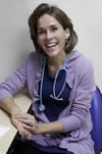 Dr. Clara van Karnebeek obtained her PhD from Amsterdam in the field of genetics of intellectual disability. She is a paediatrician in biochemical genetics, and currently works as the lead clinician-scientistin the TIDE project in BC Children’s Hospital. Dr Stockler-Ipsiroglu, MD, PhD is project leader of TIDE and holds a professorship in Paediatrics at the University of British Columbia and is the Head of the Division of Biochemical Diseases at BC Children’s Hospital. She has developed a new protocol and treatment framework together with Dr.Sylvia Stockler-Ipsiroglu , Treatable Intellectual Disability Endeavor in BC (TIDE-BC), which applies genomic technology as an essential tool for timely diagnosis of treatable conditions, to improve outcomes of children with intellectual disability. [Lectures: 1. Genomics in the Digital Era: A Tool Towards Treatment; 2. Riding the TIDE: Innovating the Diagnostic Approach to Treatable Intellectual Disabilities]
Dr. Clara van Karnebeek obtained her PhD from Amsterdam in the field of genetics of intellectual disability. She is a paediatrician in biochemical genetics, and currently works as the lead clinician-scientistin the TIDE project in BC Children’s Hospital. Dr Stockler-Ipsiroglu, MD, PhD is project leader of TIDE and holds a professorship in Paediatrics at the University of British Columbia and is the Head of the Division of Biochemical Diseases at BC Children’s Hospital. She has developed a new protocol and treatment framework together with Dr.Sylvia Stockler-Ipsiroglu , Treatable Intellectual Disability Endeavor in BC (TIDE-BC), which applies genomic technology as an essential tool for timely diagnosis of treatable conditions, to improve outcomes of children with intellectual disability. [Lectures: 1. Genomics in the Digital Era: A Tool Towards Treatment; 2. Riding the TIDE: Innovating the Diagnostic Approach to Treatable Intellectual Disabilities]
 Mojgan Yazdanpanah received her medical degree from Azad Medical University in Tehran, and then went on to do MSc and DSc in Genetic Epidemiology and her PhD on “Genetic determinants of macrovascular complications and mortality in type 2 diabetes” in the Genetic Epidemiology Unit of Erasmus Medical University in the Netherlands. She continued her Postdoctoral work at the same University in the Department of Internal Medicine working on the genetics of cardiovascular disease and diabetes using a variety of methods including a candidate gene approach and genome wide association studies. This past July, she moved to Canada and was recruited by the BC Clinical Genomics Network to increase the genetic epidemiology capacity in the province. [Lectures: NutrigenOMICS – How lifestyle choices interact with genetic disease]
Mojgan Yazdanpanah received her medical degree from Azad Medical University in Tehran, and then went on to do MSc and DSc in Genetic Epidemiology and her PhD on “Genetic determinants of macrovascular complications and mortality in type 2 diabetes” in the Genetic Epidemiology Unit of Erasmus Medical University in the Netherlands. She continued her Postdoctoral work at the same University in the Department of Internal Medicine working on the genetics of cardiovascular disease and diabetes using a variety of methods including a candidate gene approach and genome wide association studies. This past July, she moved to Canada and was recruited by the BC Clinical Genomics Network to increase the genetic epidemiology capacity in the province. [Lectures: NutrigenOMICS – How lifestyle choices interact with genetic disease]